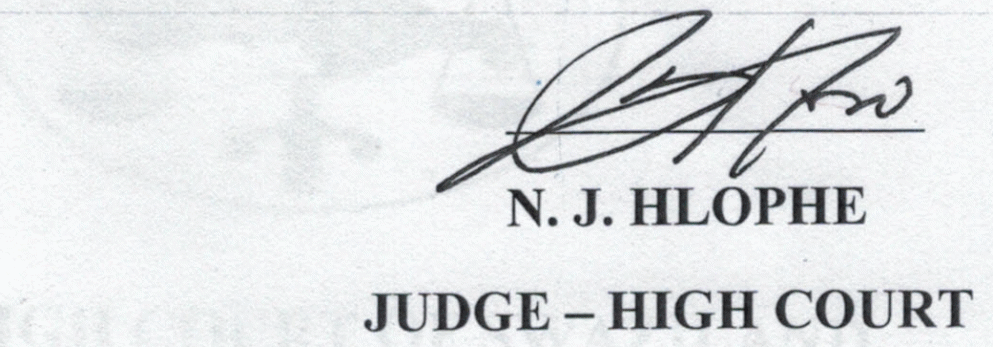- Case summary
- Criminal Law – Accused charged with Murder and Assault with intent to cause grievous bodily harm – Proof of Intention to murder cases –Whether intention proved in the matter –Assault with intent to do grievous bodily harm not disputed – Established that the accused intended to injure the complainant in a serious way – Accused guilty as charged .tb_button {padding:1px;cursor:pointer;border-right: 1px solid #8b8b8b;border-left: 1px solid #FFF;border-bottom: 1px solid #fff;}.tb_button.hover {borer:2px outset #def; background-color: #f8f8f8 !important;}.ws_toolbar {z-index:100000} .ws_toolbar .ws_tb_btn {cursor:pointer;border:1px solid #555;padding:3px} .tb_highlight{background-color:yellow} .tb_hide {visibility:hidden} .ws_toolbar img {padding:2px;margin:0px}

IN THE HIGH COURT OF ESWATINI
Held at Mbabane Case No.: 435/2014
In the matter between
REX
VS
VUSI ERNEST SHABANGU
Neutral Citation: Rex Vs Vusi Ernest Shabangu (435/2014) [2019] SZHC 246 (10th December 2019)
Coram: Hlophe J.
For the Crown: Mr S. Gama
For the Respondent: Mr X. Mthethwa
Dates Heard: 13/11/2019, 14/11/2019, 20/11/2019, 21/11/2019 26/11/2019
Date Judgement Delivered: 10th December 2019
Summary
Criminal Law – Accused charged with Murder and Assault with intent to cause grievous bodily harm – Proof of Intention to murder cases –Whether intention proved in the matter –Assault with intent to do grievous bodily harm not disputed – Established that the accused intended to injure the complainant in a serious way – Accused guilty as charged.
JUDGMENT ON SENTENCE
[1] On the 10th December 2019 this court convicted the accused person of the murder of one Boshiwe Ntshangase who happened to be his maternal grandmother, that is, the mother to his own mother.
[2] From the facts of the matter, I had concluded that the murder in question was unprovoked in so far as the deceased had objectively not done anything that would have made the accused take the decision of taking away her life. The only reason, besides perhaps his relatively young age put forth by the accused was that he believed she was or she had bewitched him. There was of course no objective evidence to prove she had ever bewitched him or even that she was bewitching him. I had however concluded that from the evidence he did entertain such a belief because there was otherwise no other reason. See Somiso Mbhamali Vs Rex Criminal Appeal Case No.38/2011 [2013 SZSC 08] (31 May 2013).
[3] The position of our law is that even though the death penalty is no longer mandatory when in a case where there are no extenuating. It is now discretionary since the advent of the constitution as was stated in numerous judgements of this court and the Supreme Court including Rex Vs Amos Mbulaleni Mbhedzi, High Court Criminal Case No,236/2009. It is still a requirement of our law that where a guilty verdict to murder has been returned the court is required to enquire into the existence or otherwise of extenuating circumstances. See the same Rex Vs Mbulaleni Mbhedzi Judgement (Supra).
[4] When handing down the main judgement in December 2019 I had indicated that the seriousness of the matter and its possible harsh sentence had been watered down by the apparent belief in witchcraft the accused person had entertained. This position still stand in my view and it makes it unnecessary for me to today embark on a further inquiry on the existence or otherwise of extenuating circumstances. My conclusion in that regard was confirmed by both Counsel who both indicated that there were existence extenuating circumstances. I have therefore concluded that in this matter there extenuating circumstances as are apparent in the accused person’s belief in witchcraft.
[5] I have to turn to the question of sentencing. This is the part of a criminal trial that has its own inherent difficulties because it calls for the balancing of various competing interests. It is the duty placed on a sentencing Court not to approach this particular question (sentencing) in the spirit of anger just as it should not entertain misplaced pity. This court is therefore alive that it should try the best it can to hold the middle ground against of all the competing interests which has often been referred to as maintaining a delicate balance. See such judgements a S V B 1985 (2) SA 120 (A) and S V Rabie 1975 (4) SA 855 (A).
[6] To overcome the temptation of handing down a lopsided sentence the law has developed the notion of a triad which emphasis the need to balance the three competing interests which are those of the accused, those of society and the nature of the offences itself.
[7] As concerns the accused it has been said that he is a first offender which this requires that this court passes a sentence that does not break him but one that gives him a chance to contribute to society after he would have served his sentence. Due to his having upheld the law from birth until he was 29 years old, it is important that the sentence I give him should not be one that breaks him therefore but one uphold it after he would have served his sentence.
[8] I also take into account the fact that he is a relative by young man who still has a future and even a potential to contribute positively to contribute positively to society once he shall have served his sentence and learnt his lesson.
[9] The accused sadly committed the crimes he did even before he was married and before he had children. In short he had not started to raise a family. It seems important that I should do the best I can to impose on him a chance to start on a family so that he can be able to contribute positively to society.
[10] The accused committed the offences he can against his own blood relatives, his maternal grandmother for the murder and his own mother for the assault with intent to do grievous bodily harm. This fact alone should trouble him for the rest of his life as he did something that is abominable and unheard of in society. However one looks at him he invited a curse upon himself.
[11] Although the accused is shown as a person who cooperated with the court, it has not been shown that he is remorseful. He has not said so himself and I doubt he has made a clean breast, but like I have observed this will in a way be taken care of by the fact that he committed abominable acts against his own close relations.
[12] Whatever factors I should take in the accused’s favour, I cannot lose sight of the fact that he has been found guilty of committing serious offences one of which resulted in the loss of life which no one is entitled to take away as it is a sacred gift by the creator. He was also convicted of having grievously assaulted his own mother rendering one of her fingers dysfunctional to this day. These acts of the accused deserve the strongest possible condemnation not only verbally but also to have such manifested in the sentence that this court imposes. In other words it should be a sentence that sends unequivocal message to other would be offenders that such crimes shall not be tolerated in society.
[13] It makes it worse that offences the use of violence against members of the public let alone women, are on the rise and have become prevalent. It is the duty of courts to try and eradicate such crimes, a prospect it will achieve by passing harsher than normal sentences to deter other would be offenders.
[14] Society has long observed that women are vulnerable and it has passed laws to try and ensure that this vulnerability is not taken for granted by other members of society. Where one has even attempted to, it is fair for society to expect that a harsher than normal sentence be imposed. This should be to protect these members of society. It is for this reason that the sentence I impose should assure society that these members of society will always receive protection.
[15] The sentences I impose should be adjusted upwards on downwards within the sentencing treads of this court and the Supreme Court as borne out in numerous judgements; a few of which I will mention for illustrative purposes. See Samkeliso Mvolati Tsela Vs Rex Case No.20/2010 Supreme Court.
15.1. In Somiso Mbhamali V Rex Criminal Case No. 38/2011 [2013]
SZSC 08, the Supreme Court of Appeal upheld and confirmed a sentence of 20 years imposed upon an accused person who had killed his aunt by decapitating her with a bush knife.
15.2. In Mandla Bhekithemba Matsebula V Rex, Supreme Court Criminal Appeal No. 2/2013, the Supreme Court reduced an accused person’s murder and rape sentence to 20 years imprisonment.
15.3. In Sabelo Kunene Vs Rex Criminal Appeal Case No.5/2016 the Supreme Court confirmed a sentence of 20 years and 18 years respectively for the murder and rape of a women against the appellant.
15.4. In Rex Vs Sandziso Lukhele High Court Criminal Case No.315/2012 this court sentenced an accused person who had killed and sodomised the deceased to 20 years imprisonment.
15.5. Recently this court sentenced an accused who killed his neighbour by hacking him several times with an axe to 18 years imprisonment. This was in the case of Rex Vs France Dodo Mthembu High Court 46/2016.
[16] This being the case where the accused killed his own grandmother by striking her with a lethal weapon in her sleep and going on to grievously assault his mother, it seems to me that the following sentence in the same range will be an appropriate one. Consequently I sentence the accused person as follows:-
16.1. The accused is sentenced to 18 years imprisonment on Count 1.
16.2. The accused is sentenced to 3 years imprisonment on Count 2.
16.3. The two sentences are to run concurrently.
16.4. The sentences shall take effect from the 13th November 2013 when he was arrested.

10